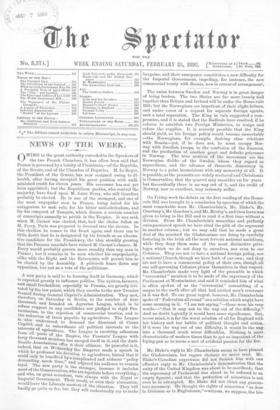Mr. Blake's reply to Mr. Chamberlain seems to have pleased
the Gladstonians, but vaguer rhetoric we never read. Mr. Blake's Canadian experience did not furnish him with one effective reply to Mr. Chamberlain's demonstration that the unity of the United Kingdom was about to be sacrificed; that the supremacy of Parliament was about to be reduced to an empty figment ; and that the protection of minorities is not even to be attempted. Mr. Blake did not think any guaran- tees necessary. He thought the rights of minorities "as dear the his- to Irishmen as to Englishmen,"—witness, we suppose, tory of the Land League and the National Leagne,—and was for a policy of mutual confidence and non-interference. Mr. Courtney in his speech made a great effort to imagine that some compromise might perhaps be conceived, but the effort was evidently not successful. He saw bow much had been gained under the Union and anticipated that it would all be lost again under such a Bill as Mr. Gladstone's. The Veto could never be used with effect in our Colonies, and it could not be used with effect in Ireland. To be of the slightest use, any guarantees for the protection of minorities must affect the re- presentatives of the popular House. The Legislative Council would be powerless. And no Home-rule Act would work at all that left delicate and complicated financial considerations to be disputed over between England and Ireland.



































 Previous page
Previous page